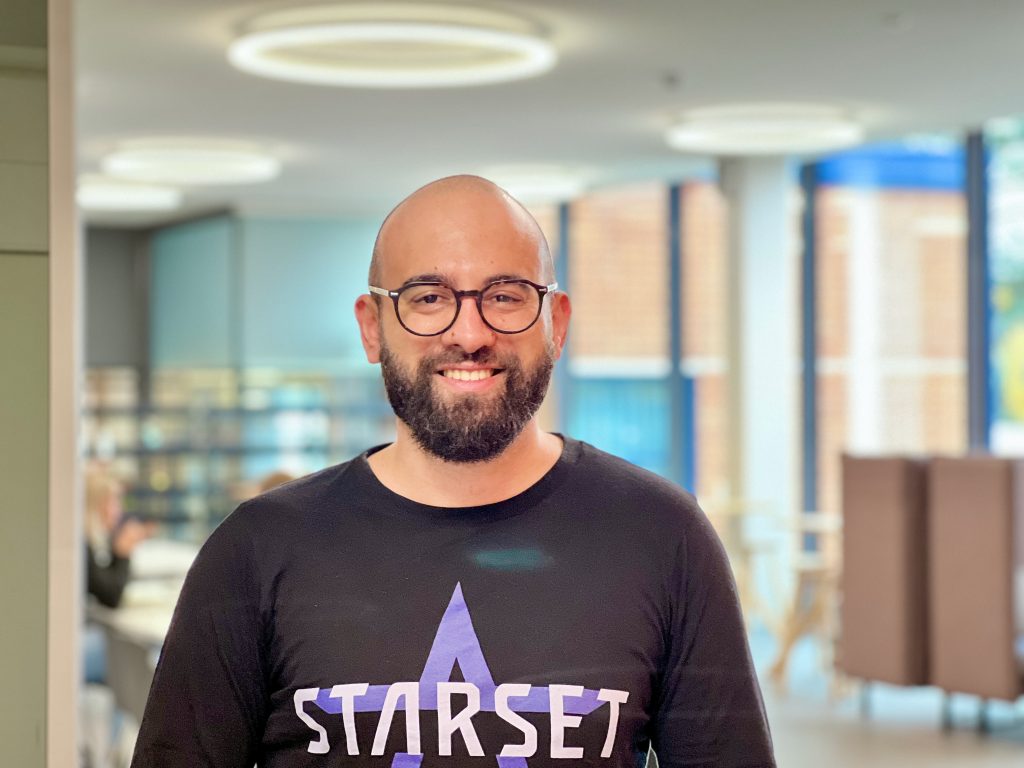19.12.2022: Alex Berg: After a Successful Journey towards the Northern Path, I Had to Head Norther
Alex Berg: After a Successful Journey towards the Northern Path, I Had to Head Norther
My name is Alex Berg. I was born in Syria where I studied English Literature and worked in translation and transcription. In late 2015, I moved to Denmark to pursue new studies, experiences and to become exposed to new cultures. There, I earned a bachelor’s degree in International Studies, and afterward a master’s degree in Development and International Relations from Aalborg University.

Throughout my studies, I had student jobs and volunteering positions in different non-governmental organizations tackling human rights issues and the rights of vulnerable people. My interest in human rights is one of the reasons I chose to pursue new fields of study where I could dig deeper into these issues through research. For example, my research focused on the rights of refugees, stateless people, and victims of female genital mutilation. Some of the other reasons for my interest in studying these contemporary social and legal issues are the lack of research on these vulnerable groups, as well as the lack of awareness about their issues, and the slow progress in improving their situation in society.
After I graduated, the most used keyword in my job search was ‘vulnerable’. Consequently, I landed a job at Aarhus Municipality in Denmark as a Coping Supervisor and Cultural Mediator. My job involved helping socially and psychologically vulnerable immigrants and citizens establish a normal and functional life. Some of the job tasks included helping them navigate the Danish Welfare System and making sure that they received the proper help and necessary services that they needed.
After a successful experience in Denmark, I decided that it was about time to experience a new exposure once again. The interdisciplinarity element that the University of Eastern Finland (UEF) underlines is one of the pull factors for my decision to pursue new areas to study in Finland. I discovered my interest in multidisciplinary research when I changed my field of study the first time. I graduated from the Faculty of Humanities in Syria. In Denmark, I studied my bachelor’s at the Department of Cultural and Global Studies, whereas I took my master’s studies at the Department of Politics and Society. Now in Finland, I am doing my PhD studies at the Department of Law. What is more exciting about this new opportunity is that my current work at UEF is part of the multidisciplinary Neuro-Innovation PhD Program, which involves 14 Doctoral Researchers in total, and focuses on brain health issues and innovation from different areas of study. My area of study is, more specifically, Welfare Law. My research will focus on the legal rights and access to justice for two vulnerable groups, namely older immigrants, and immigrants with dementia in Finland. Moving from Denmark has therefore not put an end to my journey of working with vulnerable people.
The research will employ empirical approach and will consist of semi-structured qualitative interviews with the two vulnerable groups, as well as with people providing services to them, such as social workers, health care staff, members of non-governmental organizations, and lawyers. The study will also involve a thorough policy analysis of Finnish legislations such as the Social Welfare Act, the Elder Care Act, and the Non-Discrimination Act.
The aims of my study include investigating:
- The challenges that older immigrants and immigrants with dementia might face when they seek care and support in Finland,
- The extent to which older immigrants and immigrants with dementia can make decisions about their life now and their later-life legal planning, i.e., autonomy and self-determination,
- Whether older immigrants and immigrants with dementia feel stigmatized in the Finnish society.
The concept of stigma is involved in this research because being old, or ill, or an immigrant can add to the challenges faced by these groups. The two groups of study in this research belong to at least two stigma categories: ‘old’ and ‘immigrant’, or ‘immigrant’ with a ‘disease’, or all together. This is known as ‘intersecting stigmas’. The research will therefore also study the impact of intersecting stigmas on their rights and welfare in the country.
I hope to experience positive societal impact in Finland. I would like to see the situation of these vulnerable groups improve in the future, their voices heard, and their wishes and needs considered. Some of this research’s objectives are to raise awareness among these vulnerable groups about their legal rights and to help reduce structural discrimination that can result from dealing with people from diverse cultures and backgrounds. This could be achieved by giving these vulnerable groups the chance to express their needs and the types of treatments and care convenient for them. Taking into account inputs from both the vulnerable groups and people providing services to them is crucial for developing new dynamic approaches that can benefit both the vulnerable groups and the people providing services to them. It can encourage these vulnerable people to be less reluctant to seek care and support. On the other hand, it can help people offering services to them become better acknowledged with the cultural differences among immigrant groups.